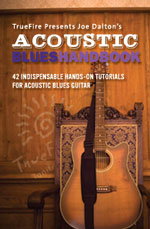
Every guitar player experiences a major turning point early on in their education. After the requisite, and often times, frustrating period of getting comfortable holding the instrument, learning a few chords and single note lines, players suddenly find themselves making real music. And it’s at that exact moment in time that we fall head over heels in love with the guitar . More often than not, that magical moment is triggered by another, more advanced player passing on a few tricks, licks and fingerpicks that are ridiculously easy to learn yet sound like a million bucks. These “guitaristic” qualities are what makes the instrument so popular but you need a good guide to get you there quickly and correctly. If you dig acoustic blues, your guide is Joe Dalton’s Acoustic Blues Handbook.
Performing artist, composer and eminent instructor Joe Dalton, has developed a series of guitar lessons designed to give the late beginner and early intermediate student a complete range of rhythms, turnarounds, solos, scales, and “guitaristic” tricks to plug in to any 12 bar blues progression.
The Acoustic Blues Handbook equips the student with all of the tools necessary to create and play their own solo blues tunes. This guitar lesson approach is modular in nature. Students learn a series of “plug-ins” including rhythm patterns, turnarounds, stop-time solos, constant bass solos, walking bass lines, fills, intros, endings and more. After getting a grip of these bite-size parts, they learn how to put them together to form entire blues arrangements.
Dalton covers a variety of melodic rhythm patterns which not only build on one another, but can also be mixed and matched. Joe also demonstrates many different turnarounds with several ways to play and present them including the use of contrary motion phrases.
Students learn chord substitutions, stop-time solos, the all important major and minor pentatonic scales (and how to mix the two by borrowing notes), walking bass lines to move from one chord to the next, fills, call-and-answer phrasing, intros and endings based off of turnarounds.
Take a peek at this video excerpt from Acoustic Blues Handbook: